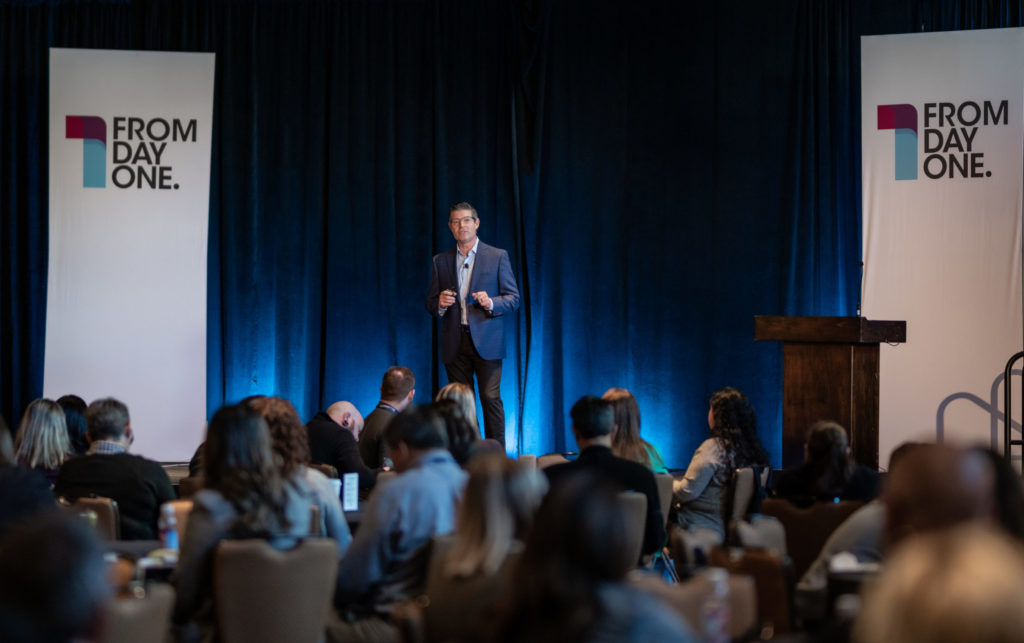‘Get Your Managers to Be Your Partners’


HR and organizational-development professionals may soon feel the sting of a tighter economy in 2023, combined with “the worst productivity ratings on record since 1947,” according to national economists. Only about 32% of employees are actively engaged with their work, according to a Gallup poll, with a particular decline among project managers. And what happens when management is lacking? Your teams spend “one-third of their time cleaning up managers’ messes,” said Jon Greenawalt, SVP of customer transformation at the performance-management platform 15Five, speaking at From Day One’s Austin conference.
Yet there is hope. To turn things around you “have to get your managers to be your partners–make them an extension of your team. That’s a mindset we all need to develop going forward,” said Greenawalt.
Why Middle Management Is So Important
Greenawalt asserts that manager training, coaching, progressive HR technology, and people science will create the modern managers we need. “Managers are the linchpin” and “middle managers are often left to their own devices, yet they have the most influence and impact on employees,” he said. Middle managers can make the biggest difference in innovation, growth, and performance for organizations. In fact, 91% of quiet quitters say that they could be more motivated to work harder, he said. And they would work harder if they had better managers.
What Do Workers Want?
With a possible recession looming, Mary Daly, president of the San Francisco Federal Reserve, said, “workers are going to stay put, ask for raises, and may go out of their way to let you know they’re satisfied.” They may only quit in their mind. Employees want to feel valued and respected, have meaningful work and know their ideas are heard. They need acknowledgment and rewards, especially when it comes to taking on extra work. Since the pandemic, employers must include flexibility, autonomy, and remote work into the benefits mix. Most of all, employees want “leaders and companies to actually care about them as a whole person. Forty percent want managers to have honest conversations about their work–and one in three say their manager can’t even lead a team,” according to Greenawalt. Workers also want to be intrinsically motivated by a shared purpose and mission. Everyone needs their “why.”

Who Is This Modern Manager?
The best leaders are self-aware and self-reflective. Managers who don’t pretend or claim to have all the answers and are committed to their own growth earn the respect of their staff. They cultivate relationships and help people feel seen and supported. Finally, modern managers create a team mindset of high performance by aligning values with the strategic goals of the organization for a powerful shared context.
Greenawalt went on to outline five key areas and tips for putting that mindset into action:
1.) Cultivate psychological safety. Start all your meetings with a check-in that has nothing to do with work. Connect as humans. Making sure people have clear roles as your business evolves is essential including defining expectations, objectives, and behaviors. “It’s like a job description on steroids,” he said. Fear-based management styles are no longer acceptable.
2.) Know and understand the strengths of your staff. Put people in positions on teams where they can shine and share what they’re best at. Blend people’s strengths and leverage them and be willing to listen and shift someone who feels they are not in the right role. Staff also “need to be free to have conversations with their leader about career growth, even if it means them leaving the company. People will leave anyways,” he said. Managers should be initiating career-growth conversations as well.
3.) Project positivity. We’re all sponges for people’s energy. Every manager should do whatever they have to do to come to work with their A game–meditate, workout–because good energy creates a ripple effect. Greenawalt added, “in addition to positive feedback, you’ve got to give constructive feedback and share it as an observation and not a judgment. Communicate: What did I see, hear, and notice?” If we approach an employee with anger, we immediately put them on the defensive.
4.) Create Intrinsic Motivation. “The sting of a rebuke lasts longer than the joy of praise,” said Greenawalt, quoting management guru Adam Grant. Pour on the praise to bring out the best in people. Make sure staff are doing work more often that truly energizes them.
5.) Challenge employees to have a growth mindset. Even those who seem very confident may never set a goal they think they can’t reach, but this is what creates true transformation. Just like climbing Kilimanjaro or running a marathon forces you to grow exponentially, managers need to be great at helping staff come up with goals they’re passionate about.
At 15Five, Greenawalt has developed an experiential software training solution for managers incorporating all these ideas. “You can’t send people off and fire-hose them for three days and hope they’re going to come back and put that into practice–one-and-done is over,” Greenawalt said. Managers need more than coaching and theory. They need skill training and applied practice. The idea is to learn, practice, and apply over and over together in cohorts getting feedback and measurement. This new manager will offer your organization significant lift and productivity as well as happy employees. And happy employees mean a happy HR team.
Editor’s note: From Day One thanks our partner 15Five for sponsoring this thought leadership spotlight.
Gail Gonzales is a writer, brand strategist and designer based in Austin. Her boutique agency, Evolve Your Brand, helps business owners who care about the positive evolution of people or the planet amplify their message.
The From Day One Newsletter is a monthly roundup of articles, features, and editorials on innovative ways for companies to forge stronger relationships with their employees, customers, and communities.